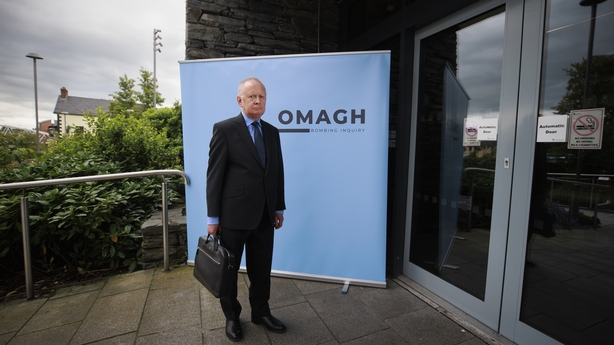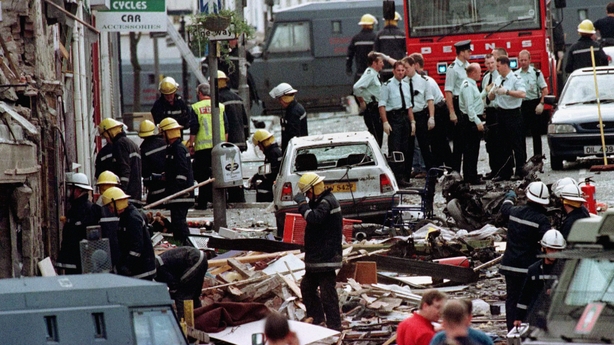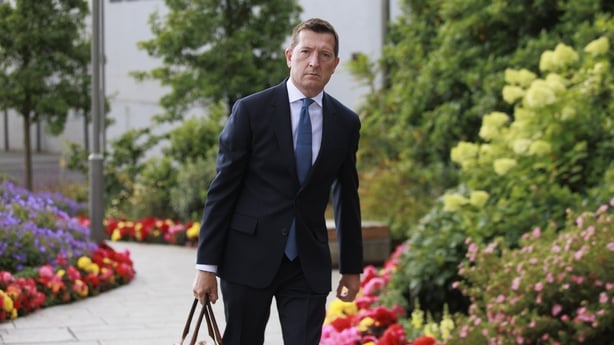The Government is committed to bringing forward new legislation if required to ensure it can assist a public inquiry into the Omagh bomb, a representative has said.
Ruairi de Burca, director-general at the Department of Foreign Affairs, told the first public hearing of the Omagh Inquiry that he was present on behalf of the Government to signal in the "clearest terms our commitment to facilitating and supporting the work of this inquiry".
The hearing of the inquiry, which is probing whether the dissident republican bomb attack could have been prevented, took place at the Strule Arts Centre in Omagh.
Some 29 people, including a woman pregnant with twins, were killed and scores of others were injured in the 1998 atrocity carried out by dissident republican group the Real IRA.
It has been contended that the terrorists prepared the bomb in the Republic of Ireland and also fled back across the border after planting it in Omagh on 15 August 1998.
The inquiry into the atrocity was ordered last year by former secretary of state Chris Heaton-Harris following a legal challenge by a bereaved family.
High Court judge Mr Justice Horner, in a judgment, directly recommended that the UK government carry out an investigation into alleged security failings in the lead-up to the atrocity.
While having no jurisdiction to order the Irish Government to act on the matter, the judge urged authorities there to establish their own probe in light of his findings.

Inquiry chairman Alan Turnbull earlier said it would not be diverted from pursuing its key objective of establishing whether the attack could have been prevented.
In his opening remarks, Mr Turnbull said the bombing had led to the murder of people ranging from unborn babies to adults.
It had been a "sudden and shocking loss", the impact of which had been felt on both sides of the border, in England and in Spain.
The fact that the bomb had been planted so soon after people north and south had voted "so comprehensively" in favour of the Good Friday Agreement had caused "consternation" across the globe, he said.
Mr Turnbull said his inquiry would guard its independence jealously and would not be diverted from pursuing its key objective of establishing whether the bombing could have been prevented.
It would be done "rigorously and fearlessly", he added.
We need your consent to load this rte-player contentWe use rte-player to manage extra content that can set cookies on your device and collect data about your activity. Please review their details and accept them to load the content.Manage Preferences
The chairman said some sessions might have to take place behind closed doors due to national security considerations, but if that happened, the public would be provided with a summary of the evidence so that they would have an understanding of the issues at hand.
Counsel to the inquiry, Paul Greaney KC, read the names of all the victims of bombing into the record and people attending were then asked to stand to observe a minute's silence.
He set out the extent of the inquiry's contact with the Irish Government in order to secure evidence, including State documents, saying there had been a series of meetings with officials from several departments and that they had been constructive.
He said both the Irish Government and An Garda Síochána had been offered the opportunity to apply for core participant status at the inquiry.
The Government replied to describe the offer as "novel" and said that it would take time to consider it.
The inquiry chair, he said, said the fullest possible co-operation was "important and important in the highest degree".
"The challenge is to see the engagement that has occurred to date translated into meaningful engagement with the inquiry's processes, both leading up to and during the course of the inquiry's oral evidence hearings.
"And in describing that challenge we emphasise that the inquiry team does not doubt that the Irish Government has a strong commitment to achieving that vital aim."
Mr Greaney said other core participants would then have 14 days to raise any questions they had about its content.
"The inquiry is grateful for the co-operative and constructive approach adopted by the Government of Ireland and An Garda Síochána in its discussions with them.
"The intention of the inquiry, may we make plain, is to ensure - with emphasis on that word - is that those discussions now move into a practical phase in which clear written agreements are put in place to make certain that the inquiry has full access to any potentially relevant materials held by the State authorities in the Republic of Ireland and that it has the ability to obtain statements and call witnesses to attend the inquiry to give evidence in person."

Mr Greaney said the inquiry was not limited to looking at the role of UK authorities and whether they could have prevented the bombing.
The inquiry was set up by the British government in response to a 2021 court ruling which found there was a plausible argument that the state could have acted to stop it.
In particular, the court raised concerns about the handling and sharing of intelligence.
Its aim is to establish whether the Real IRA bombing, the single biggest atrocity of the Troubles, could have been averted.
The dissident republican bomb exploded in the Co Tyrone town on 15 August 1998, killing 29 people, including a woman pregnant with twins.
The hearing in Omagh is a preliminary one. It will consider procedural issues relating to the conduct of the inquiry's investigation and hearings.
No witnesses will be called and no evidence will be presented at these proceedings.
Members of the public can attend and the hearing will be streamed on the inquiry's website.
The inquiry is working with a trauma counselling service to provide support for victims and survivors during the hearings.
Some of the bereaved families have called for decades for a public inquiry into alleged security failings.
Speaking on his way into the inquiry, campaigner Michael Gallagher, who lost his 21-year-old son Aiden in the bombing, said the families he speaks for were very pleased to get to this day.
He said a public inquiry was the only vehicle which could deliver the answers to the questions they had.
He said it was important that the inquiry established the rules around the calling of evidence and witnesses and he welcomed the commitment of the Irish Government to co-operate with the inquiry.
"It's important that we firm up the procedures. We don't want to wait to come to a problem in order to resolve that because that only delays the inquiry.
"So it's very encouraging that the Irish Government has come forward and say they're willing to help and to do whatever is needed. We just need now to bottom that out. We need to know how its going to work in practice."

Stanley McCombe, who lost his wife Ann in the bombing, said he had great faith in the inquiry chairman and his legal team.
"After years of hard labour we're hopeful, we're very, very hopeful," he added.
Survivors have gathered at the Strule Arts Centre in Omagh for the hearing which will include opening remarks from the chair and Mr Greaney.
Commemorative and personal statements are set to be made during inquiry hearings next January.
Earlier this month the Irish Government formally agreed to provide assistance to the inquiry.
Additional reporting PA






